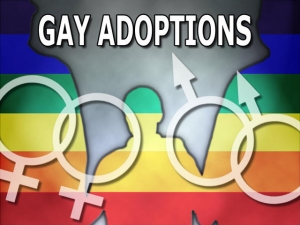Single and Gay – Where Can you Adopt?
 California’s Prop 8 and other state initiatives have sharpened the national debate on marriage equality. Less attention is paid to what may be considered a sub-issue of the marriage debate, however: adoption. Five states-Michigan, Nebraska, Utah, Mississippi, and Arkansas-currently limit adoption to couples that are either married or heterosexual only. (The Supreme Court of Florida recently made a groundbreaking holding that overturned a 30 year old state law prohibiting gay couples from adopting.)
California’s Prop 8 and other state initiatives have sharpened the national debate on marriage equality. Less attention is paid to what may be considered a sub-issue of the marriage debate, however: adoption. Five states-Michigan, Nebraska, Utah, Mississippi, and Arkansas-currently limit adoption to couples that are either married or heterosexual only. (The Supreme Court of Florida recently made a groundbreaking holding that overturned a 30 year old state law prohibiting gay couples from adopting.)
Within these five states, LegalMatch has had thousands of clients looking for adoption attorneys within the past 12 months. Of these potential clients, 32% were single, potentially disqualifying them from consideration for adoption in Utah, Nebraska, and Arkansas. 1% identified as gay, thus precluding them from adoption in all of the above 5 states. (And possibly North Dakota, which allows adoption agencies to take into account the “moral and religious” qualities of applicants.)
Why do states limit who can adopt based on marriage or sexuality? Florida’s gay adoption ban was based on the idea that parents who are gay may subject their children to ridicule and hostility from others, and may not be able to foster “proper” moral guidelines for their children. The Florida Supreme Court considered these motives unrelated to the ban, however, and rightfully so. But what about being married versus being single?
There is no scientific data showing that children are better off with married couples as opposed to unwed or single parents, or vice versa. Supporters of laws preferring married couples to unmarried couples tout anecdotal evidence or their own moral ideals that place greater weight on the idea of marriage and the alleged stability it brings, even though the national percentage of marriages that end in divorce is near 50%. In the end, laws prohibiting unmarried couples from adopting may be as unrelated to a child’s best interests as those laws prohibiting gay couples from doing the same. Indeed, many suspect that these marriage laws are more related to preventing gay couples from adopting more than anything else.
Obviously a single parent will have a lot more work cut out for them. But we have adoption agents and vigorous investigations into potential parents for a reason. Do we need laws arbitrarily deciding that married parents will always be better than un-married parents? No. Doing so only limits the number of people ready to take a child into their homes. Nationwide almost a third of the thousands of people seeking adoption attorneys last year at LegalMatch declared they were single. Would it be fair to exclude these people right off the bat, without any further investigation?
We should be able to trust our various state adoption agencies. After all, state legislatures are motivated by party politics and winning votes. Adoption agents are duty bound to make their decisions based on the best interests of the child. Who would you prefer to make the most important decision in your child’s life?


Comments
Mom Blogs – Blogs for Moms…
…
The case Florida adoption case has not yet reached the Florida Supreme Court.
You need to correct you article about that fact and then modify your comments.
I don’t think it is at all unreasonable to conclude that children are generally better off with two parents than one, just like I don’t think it is at all unreasonable to conclude that children are generally better off with live-in grandparents around than not. I certainly wouldn’t have a problem with laws giving preference to stable family units with at least two adults in them.
For the record I also see same-sex marriage as an economic luxury, and one that will probably go away as our safety net crumbles under the pressures of rising energy prices. I don’t think most people have any idea how society will have to adapt to the loss of this massive economic subsidy in the form of relatively cheap oil. This being said, let the state stay out of that question and let the people’s grass-roots organizations evolve as they need to. The state is not prepared to address these issues and never will be.
The above is all largely beside the point however. While I don’t have a problem with adoption agencies taking these things into account, I do have a problem with blanket bans. All these do, as you say, is reduce the pool of eligibility and as such ensure that children are either adopted into less fitting environments or spend their years in foster care.
I suppose a counter-argument could be made (along the lines of Palmore v. Sidoti) that even if such discrimination (short of a total ban) is in the best interest of the child, it cannot be allowed under the Constitution, but I don’t see how discriminating against a woman in a custody battle because she’s in an interracial relationship (and hence that this might cause the child social issues) is the same as the interest of providing a stable, two parent (ideally plus grandparents!) home.